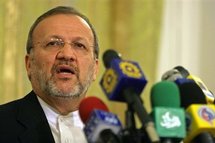Iran will 'never use' force against Muslim neighbours
Acil Tabbara
MANAMA, Acil Tabbara- Iran sought on Saturday to calm its neighbours' fears, saying it would never use force against them because they are Muslims, after Washington highlighted concerns over Tehran's suspected nuclear weapons programme.
Foreign Minister Manouchehr Mottaki made the point at a security conference two days before Iran is to sit down with world powers in Geneva for the first time since October 2009 to discuss their differences.

Manouchehr Mottaki
"Your power in the region is our power and our power is your power."
US Secretary of State Hillary Clinton had said Washington's concerns were shared by Iran's neighbours in the Gulf, through which most of the world's oil flows.
She said "perhaps the Iranians will engage seriously... on what is a concern shared by nations on every continent, but most particularly right here in the region."
"Because obviously if you're the neighbour of a country that is pursuing nuclear weapons, that is viewed in a much more threatening way than if you're a concerned country many thousands of miles away. But the concern is the same and we hope that Iran will respond."
British Defence Secretary Liam Fox told reporters: "An Iranian nuclear weapons capability will not be tolerated by the international community" as it "could destroy hopes for peace in the Middle East."
"A nuclear arms race in the region would diminish Iranian security, not protect it," Fox added.
The UN Security Council has called on Iran in six resolutions -- four of which impose sanctions -- to halt uranium enrichment, as some in the international community suspect Tehran wants nuclear weapons.
Tehran insists that its nuclear programme is purely peaceful.
After months of stalling, Iran will resume talks in Geneva on Monday and Tuesday with the P5+1 grouping of UN Security Council permanent members Britain, China, France, Russia and the United States plus Germany.
In Tehran, President Mahmoud Ahmadinejad said Iran was ready for the talks but that its "inalienable rights" were off limits, state television reported.
"We have said many times that we will not negotiate the inalienable rights of the Iranian nation with anyone, but if they want to talk about cooperation, then we are ready," he was quoted as saying by the channel's website.
"We are ready to negotiate but... (world powers) should acknowledge that the rights of the Iranian nation are non-negotiable. They should also stop being hostile," he said.
Mottaki earlier cautioned against submitting to "pressure by outsiders to divide us and create instability," saying "the presence of foreign powers will not help establish security in the region."
He said it was vital to "have stability and security, because we (Iran and its neighbours) provide the world with most of its energy," and that Tehran "is determined to guarantee international security in the field of energy."
Mottaki denied US assertions from earlier this week that the sanctions were hurting Iran, saying they "had no effect on the economy."
On next week's talks, Clinton had told Iran's delegation in Manama: "Nearly two years ago, President (Barack) Obama extended your government a sincere offer of dialogue. We are still committed to this offer.
"We continue to make this offer of engagement with respect for your sovereignty and with regard for your interests, but also with an ironclad commitment to defending global security and the world’s interests in a peaceful and prosperous Gulf region."
Mottaki called a "step forward" Clinton's remarks that Iran is entitled to a peaceful nuclear energy programme. "But these words should be turned into action," he said.
He was responding to a question about comments to the BBC in which Clinton said Iran could enrich uranium for civilian purposes in future, but only after demonstrating it can do so responsibly.
"You (Iran) have the right to a peaceful nuclear programme. But with that right comes a reasonable responsibility: that you follow the treaty you signed, and fully address the world’s concerns about your nuclear activities," she said.
--------------------------------------------------------------------------------